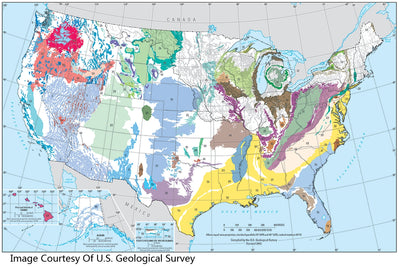What You Need To Know About Groundwater
RSS
Analies Dyjak | Hydroviv Policy Analyst
Updated 3/13/2024
What Is Groundwater?
Groundwater is submerged water located among soils, cracks and pores, beneath the surface of the earth. Groundwater travels down a gradient through geological formations and is stored in aquifers. Aquifers act as holding tanks for readily available drinking water. Rain patterns, hydrology, and ice/snow melt are the primary factors that affect how quickly a groundwater supply is replenished, also known as recharge. The recharge rate is how quickly aquifers are able to replenish the groundwater level after an influx of water.
Why Is Groundwater So Important?
It’s simple: It supplies drinking water to millions of Americans whose municipalities draw from groundwater sources (e.g. Miami, Tucson, Lincoln), as well as the 15% of people living in the U.S that use private wells as their drinking water source. In fact, the US Geological Survey estimates that 140 million people, or about 40% of the nation's population get their drinking water from groundwater sources, which include both municipal (city) water and private wells. Groundwater is also a major supplier of surface water in oceans, lakes, streams, ponds and wetlands. Crucial habitats and ecosystems are dependent on an influx of healthy groundwater, as well as surface water for public drinking water usage.
How Can Groundwater Become Polluted?
There are two major ways that groundwater can accumulate toxic chemicals:
- Natural-occurring chemicals: In some regions of the country, things like arsenic, radium, and uranium are naturally found in the rocks that come in contact with groundwater.
- Man-made Pollution: Groundwater can also become contaminated by human activities including: agriculture, industry, landfills, localized pollution, and anything that involves discharging effluent into a surrounding waterway. Polluted water seeps through soil until it reaches the water table, where it can travel freely depending on the hydrology and permeability of an aquifer. Contaminants that are particularly soluble in water (such as PFAS and 1,4-dioxane) can migrate into groundwater aquifers that serve as drinking water sources. Polluted groundwater then slowly travels through aquifers until reaching nearby surface water or being pumped through a well and consumed as drinking water.
Are There Federal Regulations That Protect Groundwater?
The Ground Water Rule was created in 2006 by the U.S Environmental Protection Agency to improve and inspect drinking water sources that may be potentially polluted by fecal contamination. This rule does not address human-made toxic and carcinogenic groundwater contamination. Additionally, the Ground Water Rule is specific to public water systems and excludes private wells.
The Federal Government does not oversee or have anything to do with regulating private wells. In fact, private wells aren’t even regulated by the Safe Drinking Water Act. This means that it’s at the discretion of the homeowner to determine if their private well water is safe for consumption. Testing private well water is extremely expensive and at times ineffective if the contamination type and concentration is continuously changing. Additionally, The Federal Government doesn’t regulate many of the contaminants in questions today.
How Can I Learn More About My Water?
If you have any questions about groundwater and regional water information, we encourage you to take advantage of Hydroviv’s “Help No Matter What” approach to technical support, where we will help you, even if you have no desire to purchase one of our water filters. Truth be told, we have access to a much larger pool of water quality data than is easily accessible to the general public. You can reach our water nerds by emailing hello@hydroviv.com or opening a Live Chat window in the bottom corner of this screen.
Other Articles We Think You'll Enjoy
Should I Worry About Arsenic Contamination If I Have A Groundwater Source?What Do I Need To Know About Recent News Reports On Radium?
How Do I Know If My Well Is Contaminated?


